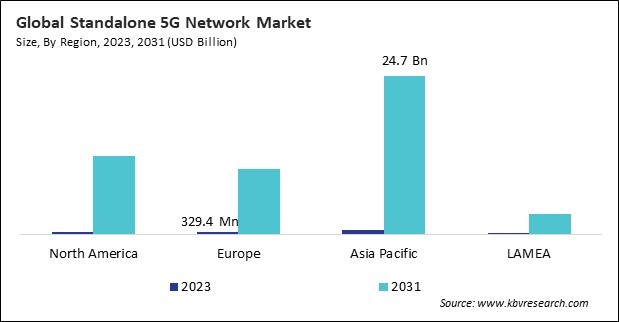According to a new report, published by KBV research, The Global Standalone 5G Network Market size is expected to reach $50.4 billion by 2031, rising at a market growth of 55.2% CAGR during the forecast period.
The Sub-6 GHz segment is leading the Global Standalone 5G Network Market by Spectrum in 2023; thereby, achieving a market value of $31.1 billion by 2031. The sub-6 GHz segment dominates the standalone 5G network market due to its ability to provide extensive coverage and reliable connectivity over long distances. Its relatively lower frequency enables better signal penetration through physical barriers like walls, making it suitable for urban and rural deployments. The widespread availability of sub-6 GHz spectrum globally and its alignment with existing 4G LTE infrastructure have further facilitated its adoption. Additionally, sub-6 GHz supports a broad range of use cases, including mobile broadband and IoT applications, driving its high revenue share in the market

The Private segment is registering a CAGR of 57.3% during (2024 - 2031). The private 5G network segment is driven by its appeal to industries seeking secure, reliable, and tailored connectivity solutions for mission-critical applications. Enterprises in sectors like manufacturing, healthcare, logistics, and energy are adopting private networks to achieve ultra-low latency, enhanced data security, and high device density, which is critical for use cases like IoT, automation, and real-time analytics. The flexibility to customize private 5G networks according to specific operational requirements and growing awareness of its benefits has accelerated its adoption.
The Solutions segment is generating the maximum revenue in the Global Standalone 5G Network Market by Component in 2023; thereby, achieving a market value of $38.1 billion by 2031. Key components such as 5G Radio Access Networks (RAN), core networks, and network management systems are in high demand as telecom operators prioritize network modernization to achieve low latency, high-speed connectivity, and enhanced capacity. The growing adoption of technologies like network slicing, edge computing, and virtualization has further fueled investments in 5G solutions. Additionally, advancements in hardware efficiency and software scalability have encouraged operators to expand their standalone 5G deployments, making solutions the largest revenue contributor.
The Enterprise/Corporate segment is anticipating a CAGR of 53.5% during (2024 - 2031). Enterprises leverage standalone 5G for high-speed connectivity, secure networks, and efficient communication systems to enhance productivity and collaboration. Use cases like virtual meetings, real-time data analytics, and edge computing solutions drive adoption. Furthermore, the flexibility of standalone 5G networks to support tailored solutions like network slicing for specific enterprise needs has boosted its uptake in this segment.
The Asia Pacific region dominated the Global Standalone 5G Network Market by Region in 2023, and would continue to be a dominant market till 2031; thereby, achieving a market value of $24,687.9 million by 2031. The North America region is experiencing a CAGR of 54.5% during (2024 - 2031). Additionally, The Europe region would exhibit a CAGR of 54.8% during (2024 - 2031).
By Spectrum
By Network
By Component
By Vertical
By Geography
 Unique Offerings
Unique Offerings